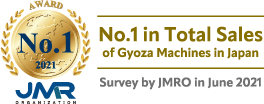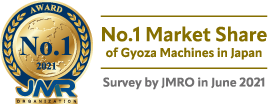TOA's Legacy of Manufacturing
The technical roots of Toa Industry can be traced back to Marusho Motor Co., a motorcycle manufacturer that was the second to start motorcycle production in post-war Hamamatsu. Through Marusho's innovative manufacturing, represented by the "Lilac" motorcycle, our founder, Yoshio Ukei, learned "technology and a spirit of challenge." Against the backdrop of post-war Hamamatsu, where many small and large manufacturers were emerging, Ukei also dreamed of becoming a manufacturer and founded Toa Industry.
Known for the "Yaramaika" spirit (a regional phrase meaning "Let's Do It"), characteristic of Hamamatsu's entrepreneurial enthusiasm, Yoshio Ukei was no exception—he was a person of creativity and challenge, always ready to try something new. Toa Industry’s gyoza machines carry on not only the taste of our customers' gyoza but also the "Yaramaika" spirit that has supported Japanese manufacturing.
1950s
Founder Yoshio Ukei
Joined Marusho Motor Co.
Yoshio Ukei, the founder of Toa Industry, joined Marusho Motor Co. immediately after graduating from high school. The president of Marusho Motor, Mr. Ito, was a junior of Soichiro Honda (the founder of Honda Motors) and had been active at "Art Shokai Co., Ltd." and "Tokai Seiki Co., Ltd." Ukei inherited Mr. Ito’s spirit of manufacturing excellence.
In 1951, our founder, Yoshio Ukei, joined Marusho Motor Co. This company, known for its innovative design, produced the "Lilac" motorcycle, which featured a shaft drive. Ukei gained experience in various departments, from design and engineering to materials and planning. The "zero-to-creation" approach he learned during this time became the foundation of Toa Industry's originality that continues to this day.
1960s
From a subcontracter
Aiming to become a manufacturer.
On August 1, 1963, Yoshio Ukei, building on his experience at Marusho Motor Co., founded "Toa Industry" with a starting team of six people. Initially, the company produced molds for automobile parts as a subcontractor for automotive companies. Riding the wave of rapid economic growth and motorization, the business progressed smoothly. In 1966, Toa Industry Co., Ltd. was officially established. While there was a path to expand as an automobile parts manufacturing company, Ukei could not abandon his desire to become a manufacturer with its own products, not just a subcontractor. He continued investing in equipment and researching his own products.

One trace of Toa Industry's ambition to become a vehicle manufacturer is this pleasure boat. Although it was never released, the name "Water Jet" and a photograph, likely for advertising purposes, remain in the company archives, suggesting that the company had nearly completed the preparations for its launch.

The NC milling machine introduced in 1969 was a major investment for Toa Industry at the time, one that some believed was beyond the company's capabilities, leading to concerns about its financial stability. However, this machine, which initially seemed difficult to manage, would soon be operating at full capacity just a few years later.
1970s
Research and development of the automatic gyoza machine begins.
Having walked the path of transportation machinery, Toa Industry led by Ukei were looking to find a breakthrough in vehicle development. However, a pivotal turning point came when Ukei, invited by the president of a food company, visited a gyoza factory. Although the gyoza machine was a latest model, Ukei felt that, from the perspective of automobile technology, there were many areas that could be improved. Moreover, the process of shaping and cutting the gyoza skin was essentially the same as pressing using molds, a technique familiar to him.
"With my skills, I can make this better," Ukei was certain. He continued his research alongside his main business, and by the end of 1975, he finally completed the first prototype. The large automatic gyoza machine, named "T-8," was the first self-branded product Toa Industry ever sold.

On December 19, 1975, Toa Industry released its first gyoza machine. Featuring 8 trays, it was capable of producing 4,800 gyoza per hour. Unlike other company's gyoza forming machines at the time, it featured fully automated filling removal, which was its standout feature, drawing attention for its high production efficiency. The photo shows the prototype.

The headquarters factory at the time, crowded with large gyoza machines. The main customers were major food companies, and the focus was on gyoza machines for supermarket retail and frozen food production. Gyoza, once a labor-intensive dish, was transformed into a convenient and accessible side dish that even busy housewives could easily prepare.

There were many twists and turns before the current mold mechanism was completed. One example is this photo. Focusing too much on replicating the movement of human hands led to a complicated mechanism for wrapping the dough, which never saw the light of day.

This photo clearly shows that Toa Industry's manufacturing roots lie in automobiles and motorcycles. The technology backed by automotive engines and motorcycle drive systems was applied, demonstrating high durability and reliability from the early models.
1980s
The arrival of the compact gyoza machine that can replicate the taste of the shop.
The first model "T-8" was born, and within five years of its release, around 200 units were sent out into the world. Reflecting customer feedback from the T-8, the "T-16" improved core technologies, such as the filling method, and achieved a texture that was highly praised by long-standing customers, leading to its great success. Further improvements led to the TX-16, which doubled the production efficiency and offered higher maintenance capabilities, continuing to be one of Toa Industry's flagship large machines.
Meanwhile, focusing on Toa Industry's "wrapping technology" that replicates various shapes and sizes of gyoza, the "compact gyoza machine" series was launched in 1988. Gyoza, which requires a lot of manual work, has different tastes, shapes, and textures depending on the shop. Despite being small enough to fit in even small businesses, Toa's "compact gyoza machines" faithfully reproduced the taste of the shop, and were embraced by restaurants and food stores across Japan, quickly becoming one of the company's main products.

The small-sized gyoza machine gained significant support from restaurants that had been preserving their unique flavors with minimal labor. By faithfully inheriting the distinct character of each shop’s gyoza, numerous prototypes were developed to highlight the advantages of automation while maintaining the authenticity of the taste.

In the late 1980s, the sales department saw significant growth due to the success of the small-sized gyoza machine. A sales and service network was established across Japan, targeting individual shop owners. Not only did the company sell the machines, but it also founded affiliated companies to provide support, enhancing the quality of its services.
1990~
From Japan’s Gyoza to Gyoza Around the World.
In the 1990s, exports to Korea and Taiwan, which had begun in the late 1980s, became more established. "Japanese Gyoza", along with Toa Industry’s gyoza machines, began to cross the seas. The introduction of Toa Industry’s gyoza machines led many businesses to add gyoza to their menus, while new food manufacturers entered the gyoza production and sales business. Toa Industry started to support these "gyoza businesses," playing a key role in their startup.
Building on the "monozukuri" (craftsmanship) techniques cultivated over the years, Toa Industry will continue its challenge to spread the charm of gyoza, a beloved part of Japanese food culture, to the world.

"Min Kitchen" proposed the idea of installing a compact gyoza machine in a mobile food stall, allowing for live production and sales at places like supermarket counters. Although this was initially a reference exhibit at food events, it led to a new initiative not just in manufacturing gyoza machines but in offering business solutions involving gyoza.

In 2010, by putting the "business solutions involving gyoza" into practice by opening its own gyoza restaurants, Toa Industry officially launched its startup support services. As a unique entity capable of helping build popular businesses from scratch, it took a new step forward in its journey.




















